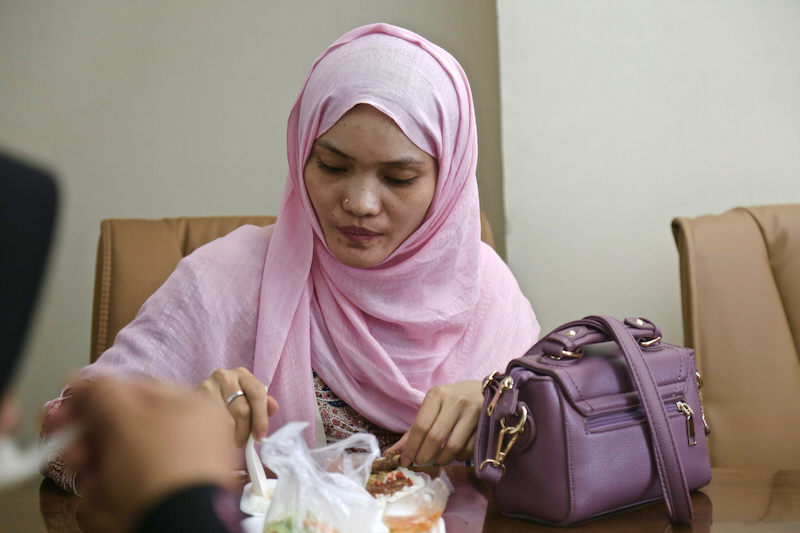A Cambodian maid who was stranded in Saudi Arabia for 12 years without money or legal documents spoke on Tuesday of the hardships she endured alone and her emotional reunion with the family she left as a 16-year-old after she finally returned home.
“It is the day I have been waiting for—to be reunited with my mom,” Sos Rotus said.

Ms. Rotus’ plight was highlighted when her desperate plea for help went viral on Facebook earlier this month. The 28-year-old was the first known Cambodian victim of human trafficking in the Middle Eastern country, an anti-human trafficking official said on Tuesday.
Saudi Arabia has a history of problems with maids alleging abuse at the hands of employers in the strict Muslim country, which operates under Sharia law.
Ms. Rotus, who said she never received a cent of her salary during all the years she worked, finally made it back to Cambodia on Monday night. Her family traveled from Kompong Thom and Preah Sihanouk provinces to greet her in Phnom Penh.
A family member said that the Saudi Arabian government had given them $13,600 as a compensation payment.
Speaking limited Khmer—she left Cambodia when she was 16 and encountered no other Cambodians abroad—Ms. Rotus said she was “so excited” to reunite with her family, who she lost contact with 10 years ago.
Ms. Rotus spoke at the Cambodian Muslim Development Foundation in Phnom Penh’s Tuol Kok district having spent the night in the capital. The foundation is funded by Othsman Hassan, a Muslim community leader and Labor Ministry secretary of state, who helped repatriate Ms. Rotus after seeing her widely-shared video on Facebook appealing for help.
She was due to travel home to Kompong Thom province later on Tuesday.
She said she had left the province in 2005 after she was unable to find work. Her highest level of education was grade six.
She relocated to Riyadh, Saudi Arabia’s capital, after being promised a relatively high-paying job, Ms. Rotus said.
She said she was told by a recruitment agency in Phnom Penh she would receive $220 per month on a two-year employment contract. The agency had traveled to her village, Trapaing Chhouk, in Baray district, Kompong Thom, recruiting Cham Muslim women to go to Saudi Arabia.
“I said I wanted to go because I was poor. I thought I would be returning home within two years,” she said.
However, she said she did not receive a single cent.
Two years after arriving, her first employer, sick of her demands for payment, dumped her at a police station, where she was sheltered and fed for six months, she said. She eventually found another job as a maid.
But her new employer also refused to pay, allegedly telling her that she would receive her salary at the end of her employment.
She had also lost contact with her family after leaving her first employer.
With no other Cambodians or an embassy to turn to, Ms. Rotus said she was miserable.
“I never met any Cambodians for the whole 12 years. I met only people from Bangladesh, Sri Lanka…. They also faced difficulties, but I was more miserable than them because I did not have any close [Cambodian] government office,” she said.
She said her hours—7 a.m. to 3 a.m.—were filled with domestic work. Though she was never given money, she was fed.
Meanwhile, in Cambodia, Ms. Rotus’ family had been trying to find her. They circulated photographs of the then-teenager amongst villagers who had traveled between Saudi Arabia and Cambodia, but to no avail.
Her mother, 55-year-old Los Nas, wept on Tuesday as she described being apart from her daughter for so long.
“I thought that she was gone, she was dead,” she said.
Ms. Nas and her sister, Ms. Rotus’ aunt, sought assistance from the Interior Ministry soon after losing contact in 2007, but they told her they could not help.
“I swear I won’t let her leave us again,” Ms. Nas said.
Chou Bun Eng, the vice chair of the Interior Ministry’s anti-human trafficking department, said on Tuesday that her agency did not receive a complaint.
Ms. Bun Eng said the case was concerning, however.
“There is no legal recruitment agency [for Saudi Arabia] thus far,” she said. The anti-human trafficking department was working on it, she added.
“There is already a victim—that means there must be a company transferring them illegally, and now we would like them to give us information,” she added.
Both Ms. Rotus and Mr. Hassan, the Labor Ministry secretary of state, claimed the offending recruitment agency was run by Ahmad Yahya, a fellow Muslim and secretary of state at the Social Affairs Ministry, though they provided no evidence for this.
Mr. Yahya and Mr. Hassan have been in a long-running dispute with each other over the construction of a road on land belonging to Phnom Penh’s Al-Serkal Mosque. Mr. Hassan successfully sued Mr. Yahya for defamation last year.
Mr. Yahya could not be reached on Tuesday.
Ms. Rotus’ uncle, Sas Zou Aisee, said the family had received $13,600 from the Saudi government, which he said was pursuing criminal charges against Ms. Rotus’ employers.
“We are grateful that she is back…with us,” he said. “We only need her back.”



